Nowhere, Somewhere, Everywhere, and Anywhere
What is the difference?
Learning English can be very hard sometimes because there are so many pairs of words that sound so much alike, but have totally different meanings. Well, sometimes there are sets of three or even four words that look and sound like each other. This lesson is about a set of four words: nowhere, somewhere, everywhere and anywhere.
It's very important to know what all of these words mean and when to use each one. They are all used very often by English speakers, and getting them mixed up can cause some serious confusion since each of the four words has its own separate meaning. They are all used to talk about places, but in different ways.
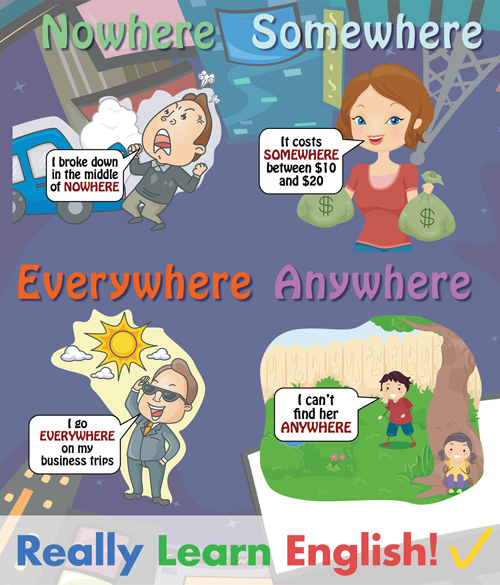
Let's go through the definitions and some helpful examples for each of these four words so that you can see when to use each one!
Click Here for Step-by-Step Rules, Stories and Exercises to Practice All English Tenses
Nowhere
The first word we will be going over is nowhere, which can be used both as an adverb and as a noun.
Nowhere refers to something or someone as not being in any place.
For example: I have nowhere to sit! (There is no place for me to sit.)
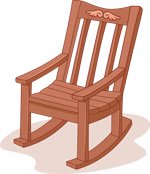
As a noun, nowhere means no place, or a place that is boring and where very few people live.
For example: They live in the middle of nowhere. (They live far away from other places.)
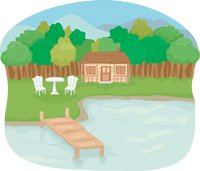
Let's go over some examples of nowhere in sentences to give you a better idea of its meaning and when you can use it.
Examples:
- My keys are nowhere to be found.
(My keys are not in any place where I can find them.)

- His car breaks down in the middle of nowhere.
(His car breaks down in a place with nothing useful or interesting around.)

- Greg's parents are worried about him because he is working a nowhere job.
(Greg's parents are worried because he is working a job with no chance of a advancement.)

- The snake that Carl stepped on came out of nowhere!
(The snake that Carl stepped on seemed to just appear where it was.)

- There is nowhere to see a movie in John's town.
(There are no places to see a movie in John's town.)

Somewhere
The next word that we will learn about is somewhere, which is also an adverb and a noun like nowhere.
Somewhere as an adverb is used to talk about someone or something being in or going to some specific place.

It can also mean close to an amount or number. You can say "somewhere between" or "somewhere around".
For example: She left somewhere around 5 pm.

It costs somewhere between ten and twenty dollars.

When somewhere is used as a noun, it means some unidentified place, or a place that you do not mention specifically.

Now let's see some example sentences for somewhere.
Examples:
- We need to stop somewhere to use the bathroom soon.
(We need to stop at an unidentified place with a bathroom that we can use.)

- The price for a piece of pizza at the mall is somewhere between three and five dollars.
(The price for a piece of pizza at the mall is a number within the range of three to five dollars.)

- Jeff is somewhere around 35 years old.
(Jeff is close to 35 years old.)

- They are going somewhere for vacation, but I do not know where.
(They are going to a place that I do not remember the name of for vacation.)

- Somewhere around the second part of the play is when I lost interest.
(At some unknown time, close to or during the second part of the play is when I lost interest.)

Everywhere:
The next word for you to know is everywhere, which is an adverb and a noun.
Everywhere is used to talk about being in or going to all places, rather than no place or some place, which is always only a single place.

Everywhere can also be used to describe things that are very common or found all places.

As a noun, everywhere means all places.
Let's take another look at some examples to get a better idea of how to use everywhere.
Examples:
- There are birds everywhere, not just in South America.
(There are birds in many parts of the world and not only in South America.)
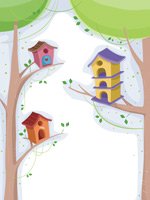
- I bring a water bottle with me everywhere I go.
(I bring a water bottle with me to all of the places that I go.)
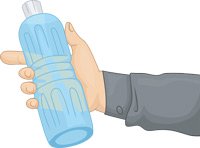
- There is construction everywhere in the city right now.
(There is a lot of construction going on in the city right now.)

- Peter goes everywhere on his business trips.
(Peter goes to lots of different places on his business trips.)

- People everywhere enjoy listening to and playing music.
(People in all places enjoy listening to and playing music.)

Anywhere:
The last word in this lesson is anywhere, which can be either an adverb or a noun.
Like the first three words, anywhere is also used to talk about places. As an adverb, it means going to or being in any place, when it does not matter where.

For example: I could live anywhere.
(It doesn't matter where I live, and all places are possible.)

Anywhere can also be used like somewhere to describe a range and show its limits. It is usually followed by the word "from" or "between" in this case.
For example: This task can take anywhere from/between three to five hours to complete.

Another use for anywhere is to provide emphasis, by describing the huge amount of possible places where something could be or where someone could go.
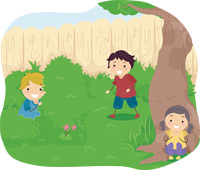
When anywhere is a noun, it means any place.
One last set of examples so that you can see some ways to use anywhere.
Examples:
- He does not know of anywhere that sells hats in this neighborhood.
(He does not know of any place that sells hats in this neighborhood.)

- There are anywhere from 20 to 100 people at the restaurant for dinner every night.
(The amount of people at the restaurant for dinner varies between 20 and 100.)
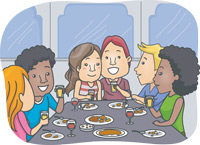
- There is no way for Hannah to find her necklace, because she could have dropped it anywhere.
(There is no way to find Hannah's necklace now, because she could have dropped it in so many different possible places.)

- Anywhere there is free food, you can find me.
(I enjoy free food very much and I often go to places that have it.)

- Brad and Lisa do not have anywhere to park a car, so they do not own one.
(Brad and Lisa do not have a place to put a car, so they do not own one.)

More Tips
Now that you have learned the differences between nowhere, somewhere, everywhere, and anywhere and have seen some examples of when and how to use each one, you should have no problem using them yourself!
It can be hard sometimes to remember which word is which, especially when there are four of them. If you are ever having trouble, you can use this trick to help yourself remember.
The four words all have the same ending, which can make them hard to tell apart, so all that you need to do is remember the beginnings of each, "no," "some," "every" and "any." Then, just replace "where" with "place" and you have your definition.
If you can remember to just look at the beginning of the word and then replace the ending with "place," you should have no problem knowing which is which!

A Story to Practice Nowhere, Somewhere, Everywhere, and Anywhere
Katie likes to go running for exercise. She runs to the store and to work and everywhere else to stay in good shape. She goes for a run somewhere in the woods near her house and finds a dog. He does not look like he has a home anywhere, so she takes him home with her. She thinks he is probably somewhere around three years old, but could be anywhere from two to five years old. Katie names the dog Spot and takes him for a run. Somewhere on their street they hear a cat meowing. They look around everywhere but it seems to be coming from nowhere.
Katie and Spot look up and see a cat in a tree. Katie asks all of the neighbors if it belongs to them, but its owner is nowhere to be found, and could be anywhere by now, so Katie decides to keep the cat as well. She wants to name it Fluffy, but there are cats named fluffy everywhere, so she calls it Mike instead. Everywhere Katie goes she takes Spot and Mike with her.
Katie's husband is sad because she does not take him anywhere, so they go somewhere nice for dinner without the pets who would have nowhere to sit in the crowded restaurant. Katie complains about her job, because she thinks it is going nowhere and wants to take a trip somewhere to relax. If she could go anywhere, she says, it would be somewhere with dinosaurs. Her husband says there is nowhere with dinosaurs because they are extinct everywhere.
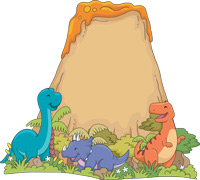
Quiz
Answer the following 12 questions and then check your answers. Each question is worth 10 points.
Part 1:
- Which of the following is a correct definition of nowhere?
- No place
- All places
- A place that you do not know about
- Three different places
- Which of the following is a correct definition of somewhere?
- A hidden place
- No place
- An unidentified place
- Any place
- Which of the following is a correct definition of everywhere?
- One place
- No places
- Too many places
- All places
- Which of the following is a correct definition of anywhere?
- Some place
- Any place
- A place that is easy to find
- Every place
- Which of the following sentences is written correctly?
- I can't find my keys nowhere.
- There are clouds anywhere in the sky, so that you can't see the sun.
- I wear my shoes everywhere I go to protect my feet.
- Lester is running because he has to be nowhere.
- Which of the following sentences is written incorrectly?
- I want to take a walk somewhere new today.
- The car that almost hit me came out of nowhere.
- Linda has anywhere from 30 to 40 cats in her house.
- I was born in a small hospital everywhere.
Part 2:
- William likes to eat ____________ between two to ten eggs for breakfast.
- anywhere
- any place
- everywhere
- nowhere
- There is ____________ I would rather be right now than at the beach.
- nowhere
- everywhere
- somewhere
- anywhere
- The Earth has plants and animals living almost ____________.
- Anywhere
- somewhere
- everywhere
- nowhere
- ____________ in the universe, there might be life on other planets.
- anywhere
- nowhere
- everywhere
- somewhere
- There are so many ants in the jungle, it's like they are ____________.
- somewhere
- nowhere.
- everywhere
- anywhere
- My aunt Debbie lives out in the middle of ____________.
- anywhere
- nowhere
- somewhere
- everywhere
Answer Key
Part 1: 1. A | 2. C | 3. D | 4. B | 5. C | 6. D
Part 2: 1. A | 2. A | 3. C | 4. D | 5. C | 6. BGet Updates, Special Offers, and English Resources
Download your FREE GIFT (the first two chapters of
English Short Stories Book and Workbook)
as soon as you join!

By submitting your email, you consent to receiving updates and newsletters from us and to the sharing of your personal data with third parties for the purposes of sending you communications. We will not spam you. You can unsubscribe at any time. For more information, please see our privacy policy.
Return from Nowhere, Somewhere, Everywhere, and Anywhere to Confusing Words





